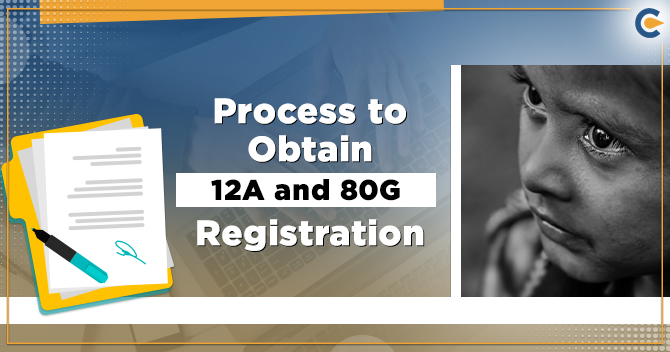NGO (Non-Government Organization) is established solely to serve non-profit humanitarian purpose in the form of Charitable Trust/Society/Section 8 Company and once such entity is formally registered it is approved of a bunch of tax exemptions, benefits, reliefs as well as provision of tax deductions for the donors. For that, 12A and 80G registrations are mandatory, otherwise, ANY income an NGO earns, like, service/production/donation, will be taken as normal taxable income without considering the purpose of such income. The commercial value of NGOs that have 12A or 80G certificates is higher than those without them.
- Only such NGOs are allowed to receive government funding
- An NGO 12A is allowed to use tax-exempt income during its lifetime
- The ability to provide valid receipts for donations (printed with the 80G registration ID), allows for tax exemptions. NGOs with an 80G Certificate are more likely to receive donors
- For 80G registration, 12A registration must be completed
- You can take 12A and 80G registrations together or separately.
- Private/Family Trusts are not eligible for the 12A Certificate
Register for 12A and 80G to Get the Best Benefits
- Through tax exemptions over income from NGO, more capital can be used for charitable activities.
- Recognized Agencies, Governments, and International Sources allow funds and grants.
- Only 12A and 80G registered NGO’s are allowed to accept International funds with exceptions under the Foreign Regulation Act, 2010, or FCRA.
- Attracts additional donors, expanding the scope of fulfilling NGO objectives.
- Registering the NGO and obtaining 12A or 80G registration will give it more operational exposure and status value.
- Each of the 12A and 80G registrations are unique and can be used for the entire life of an NGO.
Eligibility for the 12A and 80G registrations
- This provision is allowed to NGOs that work as Public Charitable Trusts or u/s 25, Companies Act, 1956 and are working only for the public welfare.
- Tax exemption is available for donations that are permitted under s. 80G
- Assets of NGOs should only be used for charitable purposes.
- It is important that NGOs keep accurate Books of Account of their receipts and expenditures.
In these cases, NGO 80G registrations can be cancelled
- If NGO runs the promotion/benefit of religion/community/caste.
- If NGO receives funds/gifts from Political Parties/International sources.
- If NGO is a profit-based unit,
- It is not allowed for NGO members to make commercial profits from NGO’s operations. If such income is received it should be separate from income earned by NGO. For such income, separate Books of Accounts should be kept.
- Any misuse of the 80G provisions could result in this certificate being cancelled.
The Package includes:
- Consultation
- Writing 12A Certificate Application
- Request for 80G Certificate
- Filing of 12A and 80G Applications and Follow-up
Documentation for the 12A and 80G registrations
Important Documents for 12A and 80G Registrations
- Photo of PAN card for registered applicant NGO
- Certificate of incorporation for NGO
- Trust Deed (in the case of a Trust) or Memorandum of Understanding, Article of Association, (AOA) of Company (in the case of a Society/Section-8 Company)
- Complete list of welfare activities
Only 12A Registration Essential Documents
- Form 10 duly completed
- Consecutive three-year financial statements (in the case where the NGO was active before the FY when the application for registration is made)
Only for registrations of 80G
- Attestation of Registered Office of NGO
- Provide property papers if you are the Registered Office.
- Legal agreement must be signed if the Registered Office is rented/leased.
- Utility bills include: Electricity bill, Telephone/Mobile Bill, etc.
- A list of donors with their addresses and PAN
- Contact details for members of the governing board of trustees.
12A Registration Procedure
Notification: Only after a registered NGO can it apply for 12A registration.
STEP-1) Filling the 10A Form
You should fill out the 10A form online and attach any relevant documents according to rule 17A of Income Tax Act, 1962 to Jurisdictional Chief Commissioner/Income Tax Commissar.
STEP-2) Verification
Commissioner will be checking the details of the application and may ask for additional documents/information, if required. These questions should be answered correctly to avoid rejection.
STEP-3: Issuance 12A Certificate
Once the Income Tax Commissioner has confirmed its validity and purpose, you’ll receive a lifetime 12A certificate for your registered NGO.
STEP-4) CONGRATULATIONS! !
Your establishment has been legally approved as an NGO and is eligible for tax exemptions under Section 12A for life.
Register for 80G
Notice: The Rule 11AA of the Income Tax Rules 1962 grants registration for 80G.
STEP-1) Filling the 10G Form
You must fill out the 10G form online and attach the relevant documents to verify the Income Return u/s 140.
STEP-2) Verification
The authorized official will conduct a thorough review of your application and may ask for additional documents/information, if required. These questions should be answered correctly to avoid rejection.
STEP-3: Issuance 80G Certificate
Your NGO will receive a lifetime certificate from the Income Tax Department of India once it has been verified that your application is authentic, relevant, and up to date.
STEP-4) CONGRATULATIONS! !
Your establishment has been legally approved as an NGO and is eligible for tax exemptions under Section 80G for life.
Alao Read-Silver Price History and Forecast Analysis Provided by Procurement Resource






